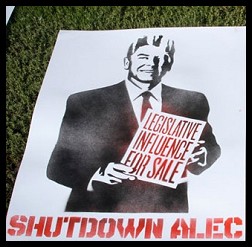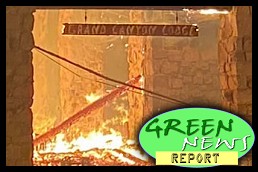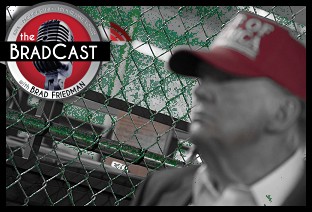Guest blogged by Ernest A. Canning
 The War for Wisconsin continues.
The War for Wisconsin continues.
In one of the latest Battles for the Badger State, Brendan Fischer of the Center for Media and Democracy (CMD) filed a broad-based ethics complaint [PDF] with the Wisconsin Government Accountability Board (G.A.B) charging that 43 Republican state legislators are in violation of both the state's ethics and lobbying laws. The named respondents in the March 23 complaint include three Republican Senators, Scott L. Fitzgerald, Van H. Wanggard and Terry Moulton, who are now facing recall elections.
The complaint alleges that lawmakers now serving in the Wisconsin state legislature violated state ethics laws by accepting corporate lobbyist-funded "scholarships", in order "to attend meetings of the American Legislative Council (ALEC)" and that many of them failed to list receipt of monies from the ALEC scholarship fund on their 2011 Statement of Economic Interests, as required by state law. In several instances, the complaint also asserts, legislators received prohibited "gifts" from corporations and their lobbyists in violation of Wisconsin ethics and lobbying laws.
The CMD complaint goes on to argue that the ALEC legislative "Task Force" system, in which "ALEC legislators and corporate lobbyists meet behind closed doors on 'model' legislation," violates Wisconsin's Open Meeting Laws. The serious charge speaks to the extent to which corporate power has not merely undermined but supplanted the very essence of "representative democracy"...
Does ALEC's privatized legislative system violate WI Law?
Wisconsin's Open Meeting Law recognizes that our form of "representative government" is "dependent upon an informed electorate," who are "entitled to the fullest and most complete information regarding the affairs of government as is compatible with the conduct of government business." To that end, the law requires that "all meetings of all state and local government bodies shall be publicly held in places reasonably accessible to...the public and shall be open to all citizens." (Wis. Stat. §§19.81(1) & (2))
ALEC, the ethics complaint alleges, is a non-profit, 501(c)(3) corporation made up of "private sector" and "public sector" members. "Its private sector members include many of the world's largest corporations, such as Koch Industries, Wal Mart, Time Warner, Pfizer & AT&T...who are primarily represented at ALEC meetings through their lobbyists", while "ALEC's public sector members are state legislators."
The thrust of the complaint is that ALEC does much more than simple "lobbying" --- the act of trying "to influence the thinking of legislators or other public officials for or against a specific cause." Its public and private sector members essentially act as a secret, unelected legislative body (legislative task force) where "corporations and legislators deliberate [and draft] 'model bills.'"
Per ALEC's bylaws, "State Chairs" (legislators) have an obligation to ensure that the "model bills" are introduced. The State Chairs and "Private Enterprise Chairs" (usually lobbyists) have some leverage for the accomplishment of that task in that they control the "scholarship" fund --- a fund donated by corporate members of ALEC and used to reimburse legislators for travel, meals and lodging expenses incurred in attending ALEC task force meetings.
Sen. Scott L. Fitzgerald (R) served as an ALEC State Chair in 2010, according to the ethics complaint. His elevation to Majority Leader in the WI State Senate placed him in a powerful position to insure that the ALEC agenda was introduced during the 2011 legislative session. That agenda, also mirrored by other ALEC members in other states, included bills to strip citizens of collective bargaining rights and new, draconian restrictions on the voting rights of previously legal voters.
The CMD ethics complaint suggests the meetings amount to de facto, secret legislative meetings, as strictly prohibited by state laws:
CMD must do more than raise a "legitimate question," however. To establish that the ALEC Task Force System violates Wisconsin's Open Meeting Law, CMD must establish that the task force sessions amount to a "meeting" of a Wisconsin "governmental body."
The theory under which CMD could proceed is actually to be found in a 2007 Open Meeting Law Compliance Guide [PDF] issued by WI's Republican Attorney General J.B. Van Hollen. Citing State ex rel. Lynch v. Conta (1976), the guide discusses the concept of a "walking quorum," in which "members of a governmental body" meet "to engage in governmental business" in a "series of gatherings among separate groups of members of a governmental body, each less than a quorum, who agree, tacitly or explicitly, to act uniformly in sufficient number to reach a quorum."
In the Conta case cited by Van Hollen, the WI Supreme Court stated that a private conference must "be analyzed to see if it is designed to avoid an open meeting requirement." The Court, as the state AG notes, "recognized the danger that a walking quorum may produce a predetermined outcome and thus render the publicly-held meeting a mere formality."
Consider the concern that a "walking quorum" can produce a fait accompli in the context of the report (and accompanying video) by Slate's David Weigel on last year's "Budget Repair Bill", which included the state's controversial prohibition on collective bargaining for certain public unions, and how it was suddenly and surprisingly rammed through the Wisconsin Assembly.
As Weigel observed at the time:
Democrats exploded as soon as the vote was called, yelling "Cowards!" and "Shame!" at the Republicans filing out of the room.
The video of that extraordinary moment follows below...
Keep in mind the gravity of the legislation for which debate was so abruptly terminated --- an act which U.S. District Court Judge William M. Conley in Wisconsin Education Assoc. Council v. Walker [PDF] described as representing "a sweeping right turn from a half century of developments in the rights of its public employees to unionize, collectively bargain and collect union dues."
Neither the gravity of this momentous change nor questions of constitutionality --- Judge Conley, in his decision issued last Friday found portions of the extraordinarily controversial Act to be unconstitutional --- were of any moment to the "walking quorum" whose apparent fealty to ALEC's private and secret legislative process seems to have rendered the "public hearing a mere formality."
'Scholarship' shell game
The CMD ethics complaint charges that the ALEC "scholarship" fund violates WI Stat. §13.625 which prohibits lobbyists from furnishing lodging, transportation and meals to legislative employees. While Section 19.56(3)(a) does permit public officials to receive such reimbursement from organizers of "gatherings to discuss...legislative...processes and proposals," here ALEC appears to engage in a "shell game." The funds, the ethics complaint contends, come directly from corporations who are principals within the meaning of WI lobbying laws. The funds, which ALEC ostensibly holds in trust, are then delegated to the State Chairs for distribution.
As the complaint alleges:
"In the past," the complaint continues, "the ethics board advised Wisconsin legislators to make the scholarship fund 'blind' so that legislators do not know which corporate interests are paying their expense." But the identity of the corporate donors, almost all of whom are principals who employ lobbyists in WI, are readily accessible. Those lobbyists attend ALEC meetings themselves. One donor, Pharmaceutical Research & Manufacturers of America (PhRMA), for example, "listed a $356,075 contribution to the 'ALEC Scholarship Fund' on its Form 990."
As set forth above, the complaint also alleges that a good number of the Republican legislators failed to report their "scholarships" on their 2011 Statement of Economic Interests, which, if intentional, could carry a fine and up to one year in jail.
Time Warner quid pro quo?
CMD's complaint alleges several outright gifts in direct violation of WI law. For example, it discusses an April 7, 2011 invitation from Time Warner Cable to a "night at the ball park." The event was to take place on April 29. It just happened to coincide with an ALEC Task Force Summit in Cincinnati, Ohio. The invitation, which was extended to registered guests and their spouses, said "ALEC will have access to the ballpark party decks where select food and drinks will be provided."
The email invitation was sent to Rep. Robin Vos (R), whose staff forwarded it to "44 individuals, primarily Wisconsin state legislators and staffers."
On 4/28/11, the complaint continues, SB 13, "a telecommunications bill that would benefit Time Warner Cable," was introduced. "That same day, thirteen of the twenty Assembly members who received the invite to the Time Warner Cable 'night at the ballpark' added themselves as co-sponsors to the bill." SB 13 was passed by the Assembly on 5/11/11.
Ernest A. Canning has been an active member of the California state bar since 1977. Mr. Canning has received both undergraduate and graduate degrees in political science as well as a juris doctor. He is also a Vietnam vet (4th Infantry, Central Highlands 1968). Follow him on Twitter: @Cann4ing.


 Trump IRS Agrees to Allow Churches to Endorse Political Candidates. Are All Nonprofits Next?: 'BradCast' 7/15/25
Trump IRS Agrees to Allow Churches to Endorse Political Candidates. Are All Nonprofits Next?: 'BradCast' 7/15/25 'Green News Report' 7/15/25
'Green News Report' 7/15/25
 Repub Support for Immigrants Skyrockets Amid Trump's Crackdown: 'BradCast' 7/14/25
Repub Support for Immigrants Skyrockets Amid Trump's Crackdown: 'BradCast' 7/14/25  Sunday 'Totally Predictable' Toons
Sunday 'Totally Predictable' Toons Democracy STILL Our Best Way Out of This Mess -- And Repubs Know It: 'BradCast' 7/10/25
Democracy STILL Our Best Way Out of This Mess -- And Repubs Know It: 'BradCast' 7/10/25 'Green News Report' 7/10/25
'Green News Report' 7/10/25 'Mass Shooter Subsidy'?: More Dumb, Deadly Stuff in Trump's New Law: 'BradCast' 7/9/25
'Mass Shooter Subsidy'?: More Dumb, Deadly Stuff in Trump's New Law: 'BradCast' 7/9/25  Trump's New Law Supersizes ICE, Mass Detention, Militarization: 'BradCast' 7/8/25
Trump's New Law Supersizes ICE, Mass Detention, Militarization: 'BradCast' 7/8/25  'Green News Report' 7/8/25
'Green News Report' 7/8/25 Texas Flooding Tragedy Was Both Predictable and Predicted: 'BradCast' 7/7/25
Texas Flooding Tragedy Was Both Predictable and Predicted: 'BradCast' 7/7/25 Sunday 'Big Billionaire Bonanza' Toons
Sunday 'Big Billionaire Bonanza' Toons Sunday 'Total Obliteration' Toons
Sunday 'Total Obliteration' Toons 'Green News Report' 6/26/25
'Green News Report' 6/26/25 Thank You For Your Attention to This Matter:
Thank You For Your Attention to This Matter: Mamdani Primary 'Win' Augurs New Era of Rising Progressives: 'BradCast' 6/25/25
Mamdani Primary 'Win' Augurs New Era of Rising Progressives: 'BradCast' 6/25/25 U.S. Authoritarianism Under-way (But We're Still Here to Fight It): 'BradCast' 6/24/25
U.S. Authoritarianism Under-way (But We're Still Here to Fight It): 'BradCast' 6/24/25 'Anti-War' Trump Attacks Iran on False Claims About WMD: 'BradCast' 6/23/25
'Anti-War' Trump Attacks Iran on False Claims About WMD: 'BradCast' 6/23/25 Senate Health Care Cuts 'More Extreme' Than House Version: 'BradCast' 6/19/25
Senate Health Care Cuts 'More Extreme' Than House Version: 'BradCast' 6/19/25 What 'Anti-War President'? MAGA Civil War Over Trump, Iran: 'BradCast' 6/18/25
What 'Anti-War President'? MAGA Civil War Over Trump, Iran: 'BradCast' 6/18/25 Trump's 'Remigration' is Code for 'Ethnic Cleansing': 'BradCast' 6/17/25
Trump's 'Remigration' is Code for 'Ethnic Cleansing': 'BradCast' 6/17/25 Last Weekend Today: 'BradCast' 6/16/25
Last Weekend Today: 'BradCast' 6/16/25
 VA GOP VOTER REG FRAUDSTER OFF HOOK
VA GOP VOTER REG FRAUDSTER OFF HOOK Criminal GOP Voter Registration Fraud Probe Expanding in VA
Criminal GOP Voter Registration Fraud Probe Expanding in VA DOJ PROBE SOUGHT AFTER VA ARREST
DOJ PROBE SOUGHT AFTER VA ARREST Arrest in VA: GOP Voter Reg Scandal Widens
Arrest in VA: GOP Voter Reg Scandal Widens ALL TOGETHER: ROVE, SPROUL, KOCHS, RNC
ALL TOGETHER: ROVE, SPROUL, KOCHS, RNC LATimes: RNC's 'Fired' Sproul Working for Repubs in 'as Many as 30 States'
LATimes: RNC's 'Fired' Sproul Working for Repubs in 'as Many as 30 States' 'Fired' Sproul Group 'Cloned', Still Working for Republicans in At Least 10 States
'Fired' Sproul Group 'Cloned', Still Working for Republicans in At Least 10 States FINALLY: FOX ON GOP REG FRAUD SCANDAL
FINALLY: FOX ON GOP REG FRAUD SCANDAL COLORADO FOLLOWS FLORIDA WITH GOP CRIMINAL INVESTIGATION
COLORADO FOLLOWS FLORIDA WITH GOP CRIMINAL INVESTIGATION CRIMINAL PROBE LAUNCHED INTO GOP VOTER REGISTRATION FRAUD SCANDAL IN FL
CRIMINAL PROBE LAUNCHED INTO GOP VOTER REGISTRATION FRAUD SCANDAL IN FL Brad Breaks PA Photo ID & GOP Registration Fraud Scandal News on Hartmann TV
Brad Breaks PA Photo ID & GOP Registration Fraud Scandal News on Hartmann TV  CAUGHT ON TAPE: COORDINATED NATIONWIDE GOP VOTER REG SCAM
CAUGHT ON TAPE: COORDINATED NATIONWIDE GOP VOTER REG SCAM CRIMINAL ELECTION FRAUD COMPLAINT FILED AGAINST GOP 'FRAUD' FIRM
CRIMINAL ELECTION FRAUD COMPLAINT FILED AGAINST GOP 'FRAUD' FIRM RICK SCOTT GETS ROLLED IN GOP REGISTRATION FRAUD SCANDAL
RICK SCOTT GETS ROLLED IN GOP REGISTRATION FRAUD SCANDAL VIDEO: Brad Breaks GOP Reg Fraud Scandal on Hartmann TV
VIDEO: Brad Breaks GOP Reg Fraud Scandal on Hartmann TV RNC FIRES NATIONAL VOTER REGISTRATION FIRM FOR FRAUD
RNC FIRES NATIONAL VOTER REGISTRATION FIRM FOR FRAUD EXCLUSIVE: Intvw w/ FL Official Who First Discovered GOP Reg Fraud
EXCLUSIVE: Intvw w/ FL Official Who First Discovered GOP Reg Fraud GOP REGISTRATION FRAUD FOUND IN FL
GOP REGISTRATION FRAUD FOUND IN FL

































